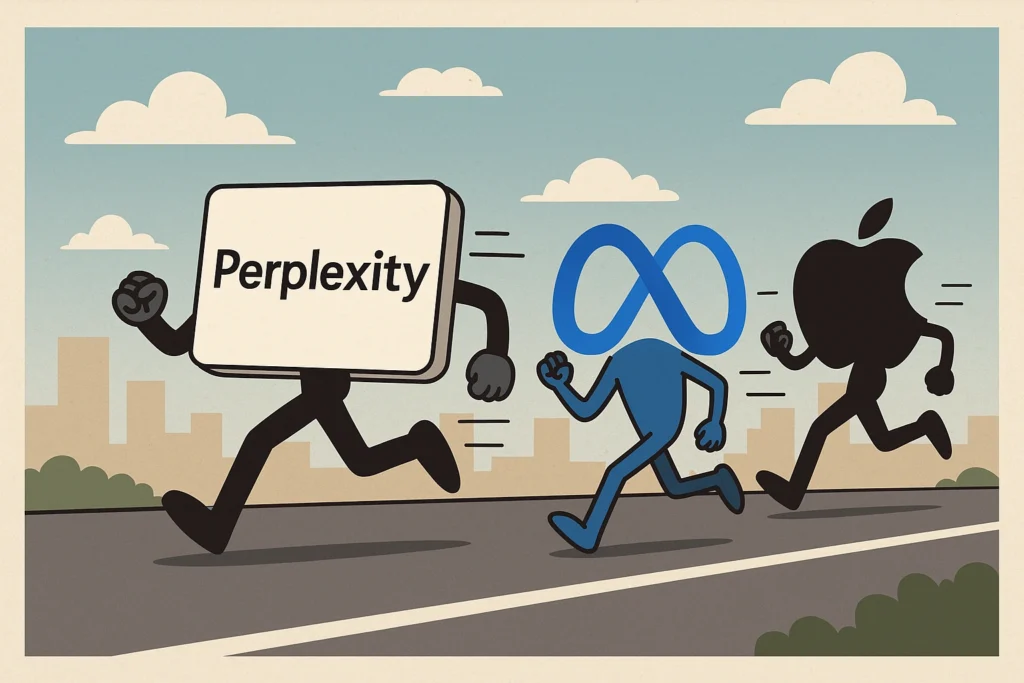A startup that simply summarizes web results is now valued at $14 billion, backed by Jeff Bezos and Nvidia, and reportedly being courted by Apple and Meta. But is Perplexity AI really the “Google killer” it claims to be—or just smart hype riding the AI wave?
Key Takeaways
- Perplexity AI is valued at $14B despite minimal proprietary tech
- Apple and Meta are in acquisition talks, signaling high interest
- The startup offers clean, ad-free answers using AI, not its own models
- Critics warn it’s repackaging content without permission
- BBC and other media outlets are threatening legal action
What Is Perplexity AI, and Why Is Everyone Talking About It?
Perplexity AI calls itself an “answer engine,” and it’s making Silicon Valley pay attention.
Founded in San Francisco, Perplexity uses large language models to answer user queries in clean, well-organized summaries—complete with footnotes. No ads. No clutter. Just answers.
Ask it something like “What’s the Genius Act?” and you’ll get a conversational explanation citing Wikipedia, Reddit, or news outlets. It’s like ChatGPT with receipts.
Perplexity AI is an “answer engine” startup that uses large language models like GPT-4 to summarize online content into quick, cited answers. Valued at $14B, it offers a cleaner, ad-free alternative to Google Search, though critics question its originality.
Big Tech Smells Opportunity
In May 2025, Perplexity closed a $500 million funding round, boosting its valuation to $14 billion, up from $9 billion in December 2024.
Backers include:
- Jeff Bezos via his family fund
- Nvidia, a major AI hardware powerhouse
According to Bloomberg, both Apple and Meta have discussed acquiring the company, though no formal offers have been confirmed. It’s clear they’re eyeing a foothold in AI-driven search—and Perplexity is the hot ticket.
Googlemade $50.7 billion from search ads in Q1 2025 alone. Even a 2–5% shift in user behaviour could impact billions in revenue.
What Makes Perplexity Different from Google?
Here’s the elevator pitch:
- Clean, ad-free search experience
- Conversational summaries with footnotes
- Chrome extension, mobile apps, and a Pro version with GPT-4/Claude
- Doesn’t build or train its own models
- Limited proprietary tech under the hood
One of the tech YouTuber recently demoed Perplexity’s Pro version, highlighting how it bypasses the usual clutter of SEO-packed Google results. But even he questioned if it’s truly innovative or just well-designed curation.
Critics Say It’s “Just Wrapping GPT in a Slick UI”
AI experts and journalists are less convinced.
Perplexity is essentially an API layer—a wrapper around OpenAI’s GPT-4 and Anthropic’s Claude—served up in a prettier interface. It’s not building foundational tech, nor is it training its own models.
Critics also raise serious ethical concerns:
- Accusations of scraping and plagiarizing news content
- Minimal attribution despite footnotes
- Risk of undercutting journalism and original content creators
Real-World Fallout: BBC Threatens Legal Action
According to the Financial Times, the BBC accused Perplexity of using its content to train a “default AI model” without permission.
They’re not alone. The New York Times, Wired, and Forbes have all flagged similar concerns. It’s part of a growing tension between AI aggregators and traditional media.
CEO’s Response: “We Want the Whole Internet to Win”
Perplexity CEO Aravind Srinivas insists the platform is simply aggregating public information.
In response to mounting backlash, the company launched a revenue-sharing program in July 2024 aimed at giving publishers a cut of the traffic and potential monetization.
But trust is fragile. With lawsuits looming and transparency lacking, questions remain.
Why Apple and Meta Might Still Want It Anyway
Even with the controversy, the interest from tech giants is real. Here’s why:
- AI search is the next battleground. Whoever controls it, controls users.
- Ad-free search is an opportunity to rebuild trust.
- Perplexity is already built and growing fast. It’s a turnkey asset in a hot space.
Think about it: Apple is increasingly pushing into AI with its recent announcements. Meta is trying to shake its dependence on Google for traffic and user intent.
It’s not about what Perplexity is now, but what it could become.
Is Perplexity the New Google—or Just a Shiny Shortcut?
The jury’s still out.
Yes, Perplexity offers a slick, simple, user-friendly way to get answers fast. And yes, its valuation and growth are impressive.
But the tech under the hood? Still largely rented from others. The legal risks? Mounting. And the innovation? More repackaging than reinvention.
Still, in a world craving better AI tools—not necessarily newer ones—Perplexity may be onto something.
